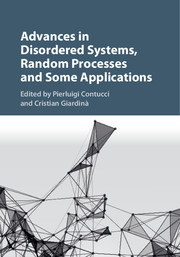Book contents
- Frontmatter
- Contents
- List of Contributors
- Preface
- 1 Topological Field Theory of Data: Mining Data Beyond Complex Networks
- 2 A Random Walk in Diffusion Phenomena and Statistical Mechanics
- 3 Legendre Structures in Statistical Mechanics for Ordered and Disordered Systems
- 4 Extrema of Log-correlated Random Variables: Principles and Examples
- 5 Scaling Limits, Brownian Loops, and Conformal Fields
- 6 The Brownian Web, the Brownian Net, and their Universality
- Index
3 - Legendre Structures in Statistical Mechanics for Ordered and Disordered Systems
Published online by Cambridge University Press: 19 January 2017
- Frontmatter
- Contents
- List of Contributors
- Preface
- 1 Topological Field Theory of Data: Mining Data Beyond Complex Networks
- 2 A Random Walk in Diffusion Phenomena and Statistical Mechanics
- 3 Legendre Structures in Statistical Mechanics for Ordered and Disordered Systems
- 4 Extrema of Log-correlated Random Variables: Principles and Examples
- 5 Scaling Limits, Brownian Loops, and Conformal Fields
- 6 The Brownian Web, the Brownian Net, and their Universality
- Index
Summary
Introduction
The aim of this paper is to report on some aspects of the Lagrange variational principles that arise in ordered and disordered statistical mechanics models.
Firstly, in Section 3.2, by working in the frame of the ensemble theory, we consider the general case of a system whose microscopic configurations are cells in phase space. Then the free energy, as a convex functional of the interaction, is conjugated to the entropy as a concave functional of the state. A dual system of variational principles connects entropy and free energy. These considerations are very instructive, because they show that the variational principle for the free energy gives the complete physical content of the theory at thermodynamic equilibrium, as the dual functional is the whole state. Of course we must allow a sufficiently detailed expression of the interaction.
In Section 3.3, we consider the particular case of mean field models, even of multispecies type. It will show how the entropic principle gives a full characterization of the free energy for very generic interactions in the infinite volume limit. The order parameters are given by interspecies magnetizations.
It is very well known (see for example [9]) that in some particular cases it is possible to exploit the convexity of the interaction, with respect to the magnetization, in order to prove firstly that the free energy density does exist in the infinite volume limit, by exploiting a kind of subadditivity in the volume, and then have the expression of the free energy through an appropriate variational principle. Some simple cases will be considered in Section 3.4. However, the variational principles that come from convexity are not in the Legendre form. We will show how to reduce them to the Legendre form through a simple procedure, which will be the prototype for a similar procedure to be exploited in the much more difficult case of the mean field disordered models, as will be explained in Section 3.9.
Section 3.5 will be devoted to a simple outline of the entropic principle for the random energy model (REM), that is introduced by Bernard Derrida in [5]. The full dual Legendre structure will be reconstructed.
- Type
- Chapter
- Information
- Publisher: Cambridge University PressPrint publication year: 2016
- 3
- Cited by



